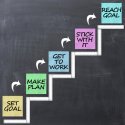Posted March 14th, 2018
By Kris Powers
Time. We all have 168 hours a week. How we allocate that time is just as different and unique as we are as individuals. However, there are many of us who wish for “just a few more hours in the day” to get things done. For example, have you thought about going back to school, or taking career training courses online, but are concerned on just where you’ll find the time to do that? Below are some ideas adapted from a recent Mission to Learn article for reclaiming time each day that could be applied towards more focused learning or another worthwhile endeavor.
- Start your day earlier (or end it later). Do you jump out of bed in the morning, ready to start your day? Or are you one whose energy kicks in around the time the sun goes down? Whatever time is your strongest, stretch it a bit. Wake up 30-60 minutes earlier or stay up 30-60 minutes later. Whatever works best for you. This is “found” time that you can use to prepare for this day or the next, take care of tasks that eat up daylight time, or study in the silence.
- Turn off the television. According to Statistic Brain, the average American watches over 5 hours of television per day – that’s over 150+ hours a month! Project that out even further and you’ll see that the average person will have spent over 9 years of their life watching television! That’s a lot of found time simply by pushing the “off” button occasionally.
- Quit browsing. Many of us are on the internet daily for work; and I am sure we are picking up some useful information in our random browsing throughout the day. However, it’s not focused learning. Limit the time you spend randomly surfing the web, trolling Twitter, and watching puppy videos on Facebook. If you do this for 30-minutes a day; you’ll end up with 3 ½ hours of time per week that you can put towards a course!
- Limit messaging. This includes email, Slack, Skype, texting. The lure of the quick message makes us pick up our phone multiple times a day to share a snippet of news, forward a photo or simply say “hello”. While connections are great, try to watch the amount of time spent on these services – perhaps setting aside only a few times a day to send messages. You’ll be surprised how many extra minutes you can find in your day without the constant distraction of back-and-forth messaging!
- Take lunch. Up to 62% of professionals eat lunch at their desks, a phenomenon that social scientists have begun calling ''desktop dining.'' Make it a point to leave your desk and go outside, or to the local diner or coffee shop, and bring along something to study. While you may still be eating lunch by the glow of a laptop, you’ll be spending that time on a worthy goal – the betterment of you.
- On the flipside, if your company will allow it, see if you can work through lunch and then leave the office an hour earlier. Use this found time after work to apply to your studies.
- Look at non-essential reading. This includes the newspaper (online or offline), magazines, fiction/non-fiction. Anything that takes time away from your more focused learning – decrease the time you spend doing it for the next 30-days or so and see what a difference it makes.
- Commute wisely. We’ve said it time and again; a wonderful time to learn is while commuting. Whether you have lessons or audio books you can listen to for class, or if you record notes yourself and listen to them on your commute – it’s time that can be well spent. If someone else is doing the driving? Even better! You can study materials all the way to work and back home in any format you’d like.
- Reduce volunteer and social commitments. I’m not suggesting giving them up completely. There does have to be a bit of work/school/life balance here! However, if there are any commitments that you can decline for the next month or so, please do. Spend that time on you, instead.
- Take a walk. If you can listen to audio content related to your course – great! If there are supporting podcasts on the topic you are studying – that’s great too. If you cannot take educational content with you, then simply getting outside and exercising has its own benefits. Harvard University reports that Regular exercise changes the brain to improve memory and thinking skills. So, lace up those sneaks and get outdoors!
Try a few of these suggestions or try them all. I think you’ll realize that you have enough time to fit more focused learning into your schedule. It’s now a matter of what kind of learning you’ll pursue!
Ed4Career is proud to offer hundreds of courses in 4 distinct areas of online education: 1) Career Vocational Training (Not-for-credit), 2) Personal Enrichment, 3) For Credit College Classes, and 4) Professional Development Training. Visit us today and learn about the Ed4Career difference!





